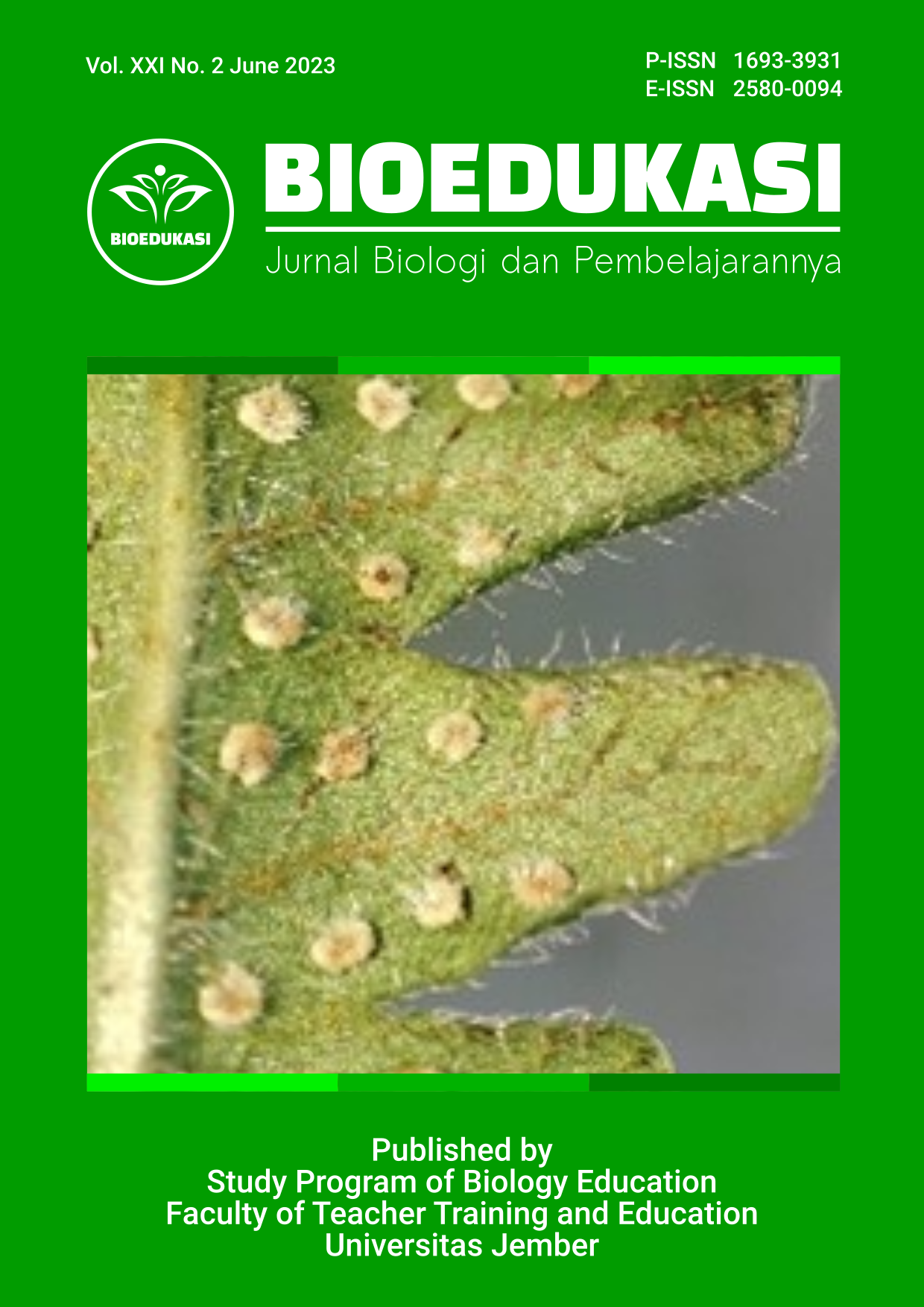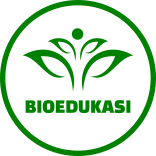Developing a Biology E-Module Based on Pjbl-Steam Model to Improve Students’ Collaboration Skills
DOI:
https://doi.org/10.19184/bioedu.v21i2.39621Keywords:
Collaboration Skills, E-module, PjBL-STEAMAbstract
Digital inequality and the pandemic have exacerbated the learning crisis, caused some learning loss, also fostered students’ individualistic attitude, which resulted in poor collaboration skills. Furthermore, the models and approaches in the teaching material activities have not reflected the stages that encouraged the practice to enhance collaboration skills. Meanwhile, collaboration skills can be trained and developed by selecting the right teaching materials that are integrated with appropriate learning models. The development of PjBL-STEAM-based E-Module is believed to be able to improve students' collaboration skills. This study used a quasi-experimental design with basic random sampling. There were two study groups: the experimental and the control groups. The instruments used in this study were a self-assessment questionnaire measuring students’ collaboration skills and teachers’ observation sheets that aligned with the collaboration skill indicators. ANCOVA test was used to analyze the data. The findings showed that the E-Module has no significant effect on students' collaboration skills (α=0,213), while the covariates indicated some factors that significantly affect the improvement of students’ collaboration skills (α=0,004). The validation results of the PjBL-STEAM-based E-Module suggested that it is highly valuable to implement in the teaching and learning process.
Downloads
References
Annisa. Rifka, M. Haris Effendi Hsb, M. D. (2018). Peningkatan Kemampuan BerpikirKreatif Siswa dengan Menggunakan Model Project Based Learning Berbasis STEAM pada Materi Asam dan Basa di SMAN 11 Kota Jambi. Journal of The Indonesian Society of Integrated Chemistry, 10(2), 42–46.
Blumenfeld, P., Soloway, E., Marx, R., Krajcik, J., Guzdial, M., & Palincsar, A. (1991). Motivating Project-Based Learning: Sustaining the Doing, Supporting the Learning. Educational Psychologist, 26(3), 369–398. https://doi.org/10.1207/s15326985ep2603&4_8
Chan, E. Y. M. (2019). Blended learning dilemma: Teacher education in the confucian heritage culture. Australian Journal of Teacher Education, 44(1), 36–51. https://doi.org/10.14221/ajte.2018v44n1.3
Degeng, I. N. S. (2013). Ilmu pembelajaran: Klasifikasi variabel untuk pengembangan teori dan penelitian. Bandung: Kalam Hidup.
Fatimah, C. (2017). Penerapan Pendekatan STEAM (Science, Technology, Engineering, Art And Mathematics) Dalam Upaya Mengembangkan Keterampilan Abad 21 Menggunakan Project Based Learning (Doctoral Dissertation, Universitas Negeri Jakarta).
Fitriani, R., Surahman, E., & Azzahrah, I. (2019). Implementasi Pembelajaran Berbasis Proyek Untuk Meningkatkan Kemampuan Berpikir Kritis Siswa. Quagga : Jurnal Pendidikan Dan Biologi, 11(1), 6. https://doi.org/10.25134/quagga.v11i1.1426
Greenstein, L. M. (2012). Assessing 21st century skills: A guide to evaluating mastery and authentic learning. Corwin Press.
Hizqiyah, I. Y. N., Nugraha, I., Cartono, C., Ibrahim, Y., Nurlaelah, I., Yanti, M., & Nuraeni, S. (2023). The project-based learning model and its contribution to life skills in biology learning: A systematic literature network analysis. JPBI (Jurnal Pendidikan Biologi Indonesia), 9(1), 26–35. https://doi.org/10.22219/jpbi.v9i1.22089
Johnson, D. W., & Johnson, R. T. (2009). An educational psychology success story: Social interdependence theory and cooperative learning. Educational Researcher, 38(5), 365–379. https://doi.org/10.3102/0013189X09339057
Julita, N. H. (2016). Profil Kemampuan Kerjasama Siswa dalam Pembelajaran IPA. (Skripsi). Bandar Lampung: Universitas Lampung.
Kimianti, F., & Prasetyo, Z. K. (2019). Pengembangan E-Modul Ipa Berbasis Problem Based Learning Untuk Meningkatkan Literasi Sains Siswa. Kwangsan: Jurnal Teknologi Pendidikan, 7(2), 91. https://doi.org/10.31800/jtp.kw.v7n2.p91--103
Kusuma, F. F., Jalmo, T., & Yolida, B. (2019). Penggunaan Discovery Learning dalam Meningkatkan Keterampilan Kolaborasi dan Berpikir Tingkat Tinggi. Jurnal Bioterdidik, 7(2).
Lee, W. W., & Owens, D. L. (2004). Multimedia-Based Instructional Design: computer-based training, web-based training, distance broadcast training, performance-based solutions (Second Edi). Pfeiffer
Lukitawanti, S. D., Parno, & Kusairi, S. (2020). Pengaruh PjBL-STEM Disertai Asesmen Formatif terhadap Kemampuan Pemecahan Masalah pada Materi Elastisitas dan Hukum Hooke. JRPF (Jurnal Riset Pendidikan Fisika), 5(2), 83–91. http://journal2.um.ac.id/index.php/jrpf/
Messier, N. (2015). The how’s and why’s of going ‘full steam ahead’in your classroom. Article Steamedu, May, 18.
Miller, M. D. (2017). Is the Educational Technology Revolution Losing Steam? What Academic Leaders Can Do to Keep Us Moving Forward. Change: The Magazine of Higher Learning, 49(2), 18–25. https://doi.org/10.1080/00091383.2017.1286212
Pepin, B., Gueudet, G., & Trouche, L. (2017). Refining teacher design capacity: Mathematics teachers’ interactions with digital curriculum resources. ZDM - Mathematics Education, 49(5), 799–812. https://doi.org/10.1007/s11858-017-0870-8
Satriawati, H. (2015). Pengembangan e-modul interaktif sebagai sumber belajar elektronika dasar kelas X SMKN 3 yogyakarta. Universitas Negeri Yogyakarta, 13(3).
Spikol, D., Nouri, J., Pargman, T. C., & Milrad, M. (2017). Emerging design: Transforming the STEAM learning landscape with the support of digital technologies. Interaction Design and Architecture(S), 34, 5–6. https://doi.org/10.55612/s-5002-034-001psi
Tabachnick, B. G., Fidell, L. S., & Ullman, J. B. (2013). Using multivariate statistics (Vol. 6, pp. 497-516). Boston, MA: pearson.
Tama, D. M. (2018). Proses Pembuatan Lagu Anak Melalui Metode Tadasa Sesuai Dengan Kecakapan Abad-21 Debby Mutri Tama: 136040055. 6040055 (Doctoral dissertation, Seni Musik).
Weiss, M. P., Pellegrino, A., & Brigham, F. J. (2017). Practicing collaboration in teacher preparation: Effects of learning by doing together. Teacher Education and Special Education, 40(1), 65–76. https://doi.org/10.1177/0888406416655457
Whatley, J. (2012). Evaluation of a Team Project Based Learning Module for Developing Employability Skills. Issues in Informing Science and Information Technology, 9, 075–092. https://doi.org/10.28945/1605
Xu, T. (2021). Psychological distress of international students during the COVID-19 pandemic in China: Multidimensional effects of external environment, individuals’ behavior, and their values. International Journal of Environmental Research and Public Health, 18(18). https://doi.org/10.3390/ijerph18189758






